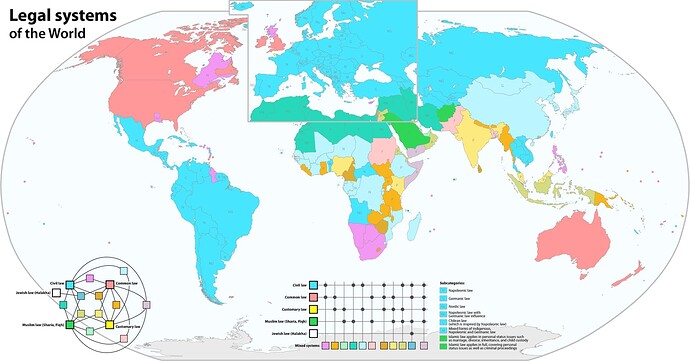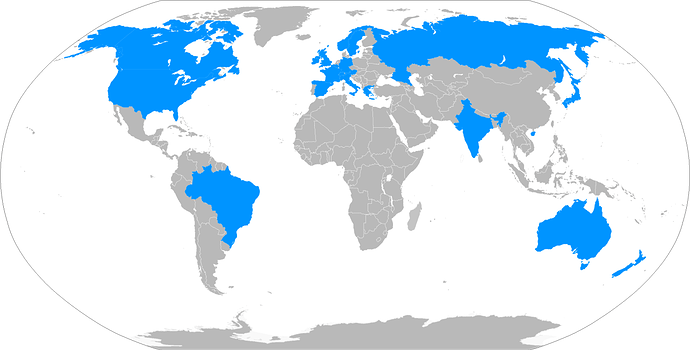About to cause the 4th indochinese war.
Viva la revulosmoker
in as a witness or journalist (preferably journalist)
any estimated start day? would it start on fill?
Isn’t it exactly opposite?
Judge who is dealing with specific type of cases will naturally be educated in them, know how they proceed and be able to issue verdict same as in other trials of simlar case.
Meanwhile when it’s all dependant on different jury each time, you are not able to make sure that each time the verdict stays the same. Even more so - you aren’t even able to make sure the backgrounds split between jury will be the same.
For example - regardless if I get judged on west or east of Poland, I know that judge will be trying to give a verdict as close to existing law, as well as other verdicts issued in similar cases.
Meanwhile if I go to north of USA and south of USA, the jury composition will be completely different. With different traditions. Which will affect the verdict, making law less unified across all country. And since they lack knowledge about other similar cases and verdict in theirs case, we cannot speak about any kind of unified legal system.
Only real case you can make is that it’s meant to prevent abuse of power. Which I don’t think is going to happen very often the goal is to unify the legal system. But if it does - you got courts of second instance which can verify if everything went correct to abiding law. Whcih basically checks the " it’s not as easy for a full jury to make a mistake that a singular judge might. Judges would also have limited accountability for their decisions, they would have a more limited perspective than a full jury" part.
Yes and no.
Let’s start with main difference - civil vs common law.
Civil law is a law where verdicts are pretty much dictated by penal codes, which are created by either government, or more often - gathering of judges. They give you the “possible penalties” for each crime. Ergo - giving a verdict AND deciding a penalty requires specific knowledge of the law. Meaning person deciding on it should finish specialised law school.
Then within this penalty ranges, judges try to keep coherent results for similar conditions surrounding a crime.
Common law is different in a way that punishment is decided basing on different previous trials, without complicated penal laws. Whcih allows for non-educated person to just google similar trials and see how they went, if they wanted to. Or just don’t if they don’t. Ergo - common law is more… simplified law type, if that makes sense. But also through this - less coherent. And IMO easier to be influenced.
As per jury systems - yes and no. Most of EU countries have in theirs laws possibilities of using them.
However they are in VERY specific cases - for example in Sweden you can call a trial via jury only for the infringement of freedom of press. And I believe it happened last in 90s?
You know, basically in cases of people vs country for very specific breaks of constitutional law.
Then there is many other countries which don’t use juries at all.
Jury system was mostly spread out through the world through British. But even then some countries like India actually don’t use it anymore.
I believe there was a trial in 60s there where jury plead non guilty on man who killed his wife’s lover and went to Police admitting he did that. Judge taken it to some higher up body in India and they overridden the verdict, which started era of decline of jury system there. Even if law technically allows them there, they weren’t use for more or less 50 years now.
And here is a map of which countries CAN have some kind of jury in legal system - but as I said, it’s per where it’s allowed, meanwhile some of them didn’t have ones for decades. Or are limited to certain cases.
But yeah, if we are talking about criminal cases, I believe jury only takes place in specifically - UK, Canada, USA and Australia?
Who’s going to sustain or deny my objections then?


I’d play
in as witness, journalist or jury (in that order)
Half of yall say the journalists are irrelevant
The other half want to be journalists
I’m used to these types of games. I can straight up be defense or prosecutor.
This sounds very interesting. I’d love to the defendant.
(Interest Check) Perjury
I think that’s called entrapment.
I am intrigued by the show of interest.
For all intents and purposes, I usually personally prefer to start games at a set time a day or so after fill when there’s a soft player cap. There is no estimated start day as of this moment because there is currently nothing to start
This is the system I’m familiar with. Common laws are developed on the basis of precedent by judges, and so are based on decisions made in the past over centuries. If there does not exist a previous case that can be referred to, the decision made becomes a new common law. However, statute laws (or legislation) supersedes the ruling of common law, and so all cases start by interpreting statute laws.
Interested Parties
YoubutWorst
Beancat
Squirrel
Leafia
Silviu
Eliza
Suggested Amendments
- More clearly establish the power of the journalists.
- Substitute jury for judge.
- Draw a map.
Mox Trial
Legendary Artifact
{T}: Choose a Creature. If that creature destroyed another creature this turn, add {B}. Otherwise, add {W}
Suggestions:
It’s not like the jury is never allowed to talk to eachother. Couldn’t the Jury talk amongst themselves?
- Following on that, you might have some corrupt jurors who, for various reasons, might be inclined to reach a certain conclusion, and can only win based off of that.
There would definitely be some journalists who want to have the result of the trial be what aligns with reality, and could only win based off of that.
Witnesses can and will be misinformed, even if they want to accurately attest to the truth. (This is also one of the reasons why eyewitness testimony is considered to be the least credible evidence in a court of law)
hes only saying this bc i watched him kill someone


